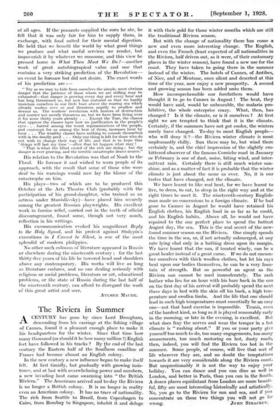The Riviera in Summer
ACENTURY has gone by since Lord Brougham, descending from his carriage at the fishing village of Cannes, found it a pleasant enough place to make it his headquarters for the winter. Since that time how many thousand (or should it be how many million ?) English feet have followed in his tracks ? By the end of the last century the Eastern half of the Sou ern coastline of France had become almost an English colony.
In the new century a new influence began to make itself felt. At first timidly, but gradually with growing insis- tence, and at last with overwhelming power and numbers, a new invading host came swarming into " the British Riviera." The Americans arrived and to-day the Riviera is no longer a British colony. It is no longer in reality even an American colony. It has no trace of nationality. The rich from Seattle to Brazil, from Copenhagen to " Cairo, from Bombay to Singapore, inhabit it and deluge it with their gold for those winter months which are still the traditional Riviera season.
But with the change of nationality there has come a new and even more interesting change. The English, and even the French (least expected of all nationalities in the Riviera, half driven out, as it were, of their customary places in the winter season), have found a new use for the coast. They have taken to going there in the summer instead of the winter. The hotels of Cannes, of Antibes, of Nice, and of Mentone, once silent and deserted at this time of the year, now enjoy a new prosperity. A second and growing season has been added unto them.
How incomprehensible our forefathers would have thought it to go to Cannes in August ! The heat, they would have said, would be unbearable, the malaria pro- hibitive, the whole enterprise crazy. What, then, has changed ? Is it the climate, or is it ourselves ? At first sight we are tempted to think that it is the climate. Certainly, if the summers have not got cooler, the winters surely have changed. To-day to most English people— who will deny it ?—the Riviera winter climate is most unpleasantly chilly. Sun there may be, but wind there certainly is, and the chief impression of the slightly em- bittered observer of the famous Corniche road in January or February is one of dust, noise, biting wind, and inter- mittent rain. Certainly there is still much winter sun- shine, and as a matter of fact it is probable that the winter climate is just about the same as ever. No, it is our tastes that have changed, not the climate.
We have learnt to like real heat, for we have learnt to live, to dress, to eat, to sleep in the right way and at the right times to meet it. The nineteenth-century English- man made no concessions to a foreign climate. If he had gone to Cannes in August he would have retained his English clothes, his English food in so far as, he could, and his English habits. Above all, he would not have repaired to the one perfect place to spend the hottest August day, the. sea. This is the real secret of the new- found summer season on the Riviera. One simply spends the time in the sea, or, if not actually submerged, at any rate lying clad only in a bathing dress upon its margin. We have learnt that the sun, if treated wisely, can be a great healer instead of a great curse. If we do not encum- ber ourselves with thick woollen clothes, but let his rays beat upon our bodies themselves, he can be a very foun- tain of strength. But so powerful an agent as the Riviera sun cannot be used immoderately. The rash bather who lies for an hour with his _bare back in the sun on the first day of his arrival will probably spend the next three days in bed with the skin off his back, a high tem- perature and swollen limbs. And the life that one should lead in such high temperatures must essentially be an easy one—not that hard exercise is impossible. Tennis, even of the hardest kind, as long as it is played reasonably early in the morning, or late in the evening, is excellent. But what does fray the nerves and wear the temper in a hot climate is " rushing about." If you or your party give yourself too much to do, too many engagements, too many amusements, too much motoring on hot, dusty roads, then, indeed, you will find the Riviera too hot in the summer. Some people, of course, will live that sort of life wherever they are, and no doubt the temptations towards it are very considerable along the Riviera coast. I3ut unquestionably it is not the way to enjoy your holiday. You can dance and you can dine as well in London, and better in Paris, than you can in the South. A dozen places equidistant from London are more beauti- ful, fifty are most interesting historically and artistically. No, you go to the Riviera for sun and sea, and if you concentrate on these two things you will not go far






























 Previous page
Previous page